Ultimate Compost Tea Guide
Compost in the garden will improve your soil which in turn will reward you with strong plants that are better able to fend off droughts and diseases. Compost improves soil structure and drainage. It can also be used as a fertilizer or a mulch and it enhances the soil’s ability to absorb water. A stronger fertilizer for your garden is compost tea
![]() Basic compost tea recipe
Basic compost tea recipe
There are many different ways to make compost tea but most recipes can be summarized by saying, if you steep compost in water you get compost tea.
You will need:
- a 5 Gallon Bucket(If you’re buying it new, make sure to wash it thoroughly with white vinegar to remove any trace chemicals),
- stir stick(I literally use a tree branch, to again avoid any chemicals leeching out),
- water(Using rain water is the best way to make compost tea but you can get by with tap water if rain is scarce. Tap water usually contains enough chlorine in it to kill off all of the beneficial bacteria so it’s best to let it sit for a few hours before using it).
- and a few shovel fulls of quality compost.
Start by filling your bucket about 1/3 full of compost. Use compost from the bottom of your pile, where organic matter has decayed the most and is teeming with life.
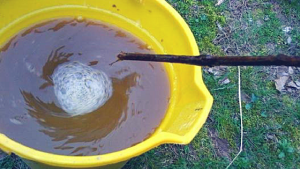 Next – fill the bucket to within an inch or two of the top with water.
Next – fill the bucket to within an inch or two of the top with water.
Stir the compost good with a stick or the end of your garden shovel. Over the course of the next 5 to 7 days, stir the bucket a few times each day. This aeration of the water and the stirring of the compost helps to release more nutrients into the water, much like dunking a tea bag releases more tea into your drink.
At the end of 5 to 7 days, simply strain the mixture through a piece of burlap, mesh screen or a strainer, and you are left with the magical liquid gold fertilizer called compost tea!
Store in an air tight container to keep the “liquid gold” at it’s best nutrient levels.
You can get a little more fancy in your compost tea making if you desire. It has been shown that adding a simple aquarium pump to the bucket and letting it run to percolate the mixture will increase the potency of the finished mixture, and can be completed in as little as 2 days. Others also add molasses or sugar to the mixture to increase the absorption of the water and organisms.
![]() Best time to use compost tea
Best time to use compost tea
In the middle of the growing season the initial soil enhancements may be somewhat depleted by continuing plant growth, plus the plants themselves may need a bit of a boost. This is especially true just as they are producing fruits and seeds for us such as cucumbers beginning to bear fruit or peas starting to swell in the pods. These are times of great energy use by the plants and a lift can help them produce a bumper crop.
Compost tea is a great liquid fertilizer in these situations:
![]() There is no need to disturb the soil and dig in fertilizer, just pour it on. This is especially important for plants like cucumbers, peas and beans that hate having their roots disturbed.
There is no need to disturb the soil and dig in fertilizer, just pour it on. This is especially important for plants like cucumbers, peas and beans that hate having their roots disturbed.- Unlike commercial liquid fertilizers it will not burn plant foliage or roots, no matter the concentration.
- It is easy to make and there is no waste.
What exactly are the benefits of compost tea? I have outlined four benefits below that should make you get excited about getting out there to create some compost tea of your own.
- Usage : You could just take your compost and mix it in with your soil, but before you do, make some compost tea with it. Brewing compost tea with your compost does not degrade the compost itself thereby extending the use of it by adding in another dimension. Brewing compost tea creates a liquid version of your compost.
![]() Disease Suppression: Although there is not much scientific data backing this theory up, many expert gardeners and horticulturists agree that when you spray it on the leaves of your plants, it has shown to suppress some diseases that fruits and vegetables are susceptible to.
Disease Suppression: Although there is not much scientific data backing this theory up, many expert gardeners and horticulturists agree that when you spray it on the leaves of your plants, it has shown to suppress some diseases that fruits and vegetables are susceptible to.- Increase of Nutrients : As with humans, the assimilation of liquid into the blood stream is much faster than solids. The same holds true for plants. As noted before, it is a liquid fertilizer and this allows for a greater amount of nutrients to be absorbed by your plants much quicker than other means or methods.
- Better Flavors : In taste tests between vegetables and fruits that have been treated with it and those that have not, the flavor of the fruits and vegetables were scored higher.
This liquid compost extract provides the same benefits to a plant as solid compost but it doesn’t stop there. Not only can the tea can applied to the soil around plants like regular compost, but it can also be sprayed directly on the leaves. When sprayed directly on the leaves, it increases the amount of nutrients available to the plant and helps fight foliage diseases. It will even increase the nutritional value and improve the taste of vegetables.
When applying liquid compost extract with a sprayer you should worry about clogs. A simple way to avoid clogging the sprayer, attach some cheese cloth or a piece of panty hose to the sprayer’s intake with some rubber bands and you should be fine.


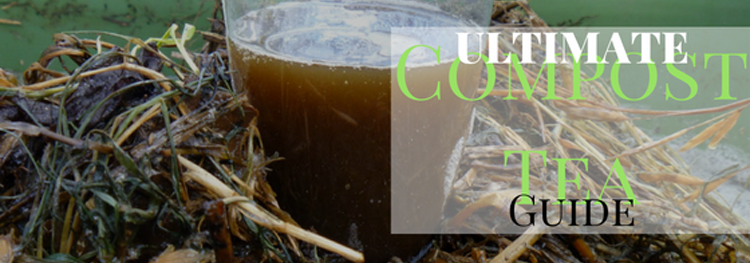
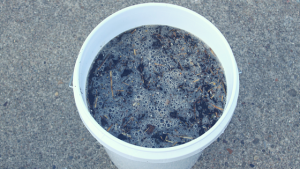 Basic compost tea recipe
Basic compost tea recipe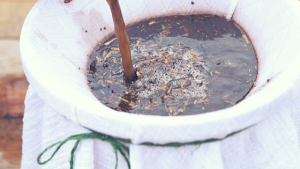 Best time to use compost tea
Best time to use compost tea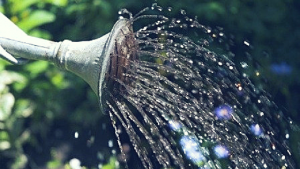 There is no need to disturb the soil and dig in fertilizer, just pour it on. This is especially important for plants like cucumbers, peas and beans that hate having their roots disturbed.
There is no need to disturb the soil and dig in fertilizer, just pour it on. This is especially important for plants like cucumbers, peas and beans that hate having their roots disturbed.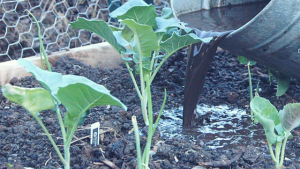 Disease Suppression: Although there is not much scientific data backing this theory up, many expert gardeners and horticulturists agree that when you spray it on the leaves of your plants, it has shown to suppress some diseases that fruits and vegetables are susceptible to.
Disease Suppression: Although there is not much scientific data backing this theory up, many expert gardeners and horticulturists agree that when you spray it on the leaves of your plants, it has shown to suppress some diseases that fruits and vegetables are susceptible to.
Comments are closed, but trackbacks and pingbacks are open.